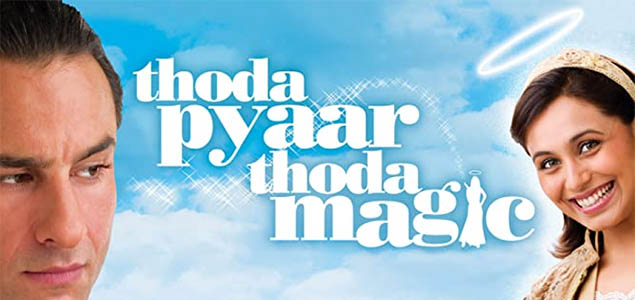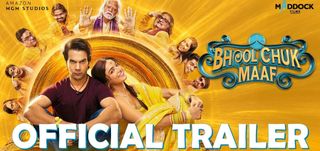
Thoda Pyaar Thoda Magic Movie Review
Thoda Pyaar Thoda Magic (TPTM) is not a great work of art. It doesn't cause ripples across the cinematic stratosphere. It does something even better. It makes you feel warm and comforted about the quality of contemporary life. No matter how awful things seem, there's always that core of goodness in the human heart to count on. This film makes you count your blessings.
Kunal Kohli taps into that noble core, so elusive in our cinema. The last film that was as noble-intentioned as TPTM was Ashutosh Gowariker's "Swades".
For all his acute sensitivity and storytelling acumen, Gowariker was awfully out of breath while dealing with the child actor in "Swades". In contrast, Kohli is at ease with his four child actors who have been selected not for their overt cuteness but their propensity to play the characters that they have been allotted with restrain and understanding.
Each of the four brats, forced by law to come and live with the man who accidentally killed their parents, sparkle with spontaneous credibility. Kohli treats the kids as young adults and he treats the audience with as much respect. He gives us what we apparently want - emotions, laughter and drama. But he makes sure his plot doesn't become a slave to conventional prescriptions.
It's not easy to desist from using a patronising tone for the children when they are orphans trapped in an adult situation that they don't understand.
Kohli does a fantasy spin where the sassy and spiffy words and storytelling offset the quaint arcadian story of the four orphans and a cantankerous tycoon who we soon discover is constantly unhappy on account of a girlfriend who only talks about designer clothes.
For enlightened conversation he must turn to a poker-faced butler (Razzak Khan), a business associate on the webcam (who talks in an indeterminate accent) and later the four children who are forced on him with a god-sent angel who infuriates him by constantly laughing in his face.
More than "Mary Poppins", Kohli is inspired by "The Sound Of Music" and I don't mean the soundtrack created by Shankar-Ehsaan-Loy.
Saif's ceaseless scowl could well be a spillover from what Christopher Plummer wore as a passion statement way back in the 1960s in the Roger & Hammerstein musical. And Rani Mukherjee could be a desi Julie Andrews popping out of a cottony heaven run by a god who looks a lot like Rishi Kapoor.
The idyllic theme often takes off into a realm of commodious fantasy with children prancing with animals - both real and computerised - in what could happily be seen as a modern day interpretation of Gulzar's "Parichay".
TPTM leaves you with a feeling of warmth and well-being. It's an all's-well-with-the-world anthem on celluloid sung at a pitch that pointedly avoids the higher notes and scales some sweet tender octaves in tones that sound like paeans to heaven.
More than anything else, TPTM bowls you over with its nobility of purpose. Though inured in the condensed milk of human kindness, the narration never plummets into becoming an occasion to flaunt some jaundiced utopia - not even when Kohli, very bravely inspired by Raj Kumar Hirani, brings footage of Mahatma Gandhi into the narration.
Rani lends an aura of mischievous artlessness to the angel's role. Saif is all scowls and pursed lips, but nonetheless emotive in parts. Amisha Patel's benign bimbo act depends more on styling than substance.
Sudeep Chatterjee's camera work is gloriously wedded to gloss. Every hair on the head glistens with glamour. Every scowl is on the prowl for perfection.
This is a film that no one can hate. It doesn't have a single "bad" character, not even badly-written characters. In just two sequences Sharat Saxena as the legal eagle lets you know all we need or want to know about his life. The children tell us the rest.
OTHER REVIEWS



















